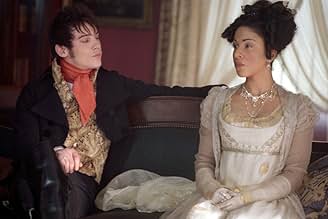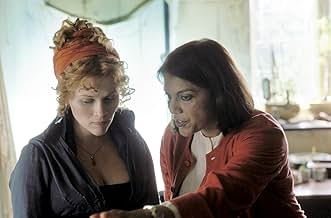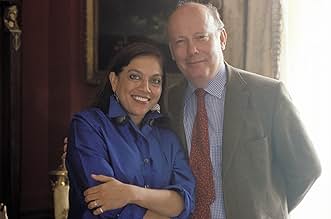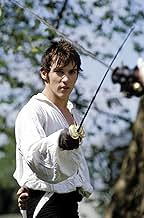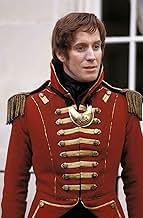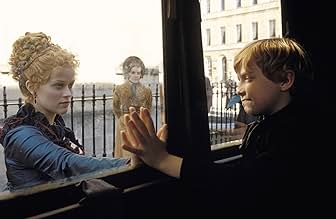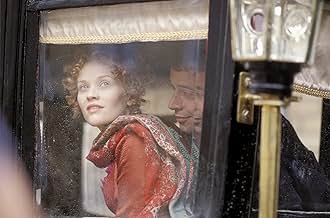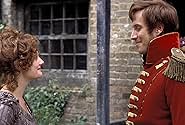VALUTAZIONE IMDb
6,2/10
23.959
LA TUA VALUTAZIONE
Crescendo povera a Londra, Becky Sharp sfida il suo passato di povertà e sale la scala sociale insieme alla sua migliore amica, Amelia Sedley.Crescendo povera a Londra, Becky Sharp sfida il suo passato di povertà e sale la scala sociale insieme alla sua migliore amica, Amelia Sedley.Crescendo povera a Londra, Becky Sharp sfida il suo passato di povertà e sale la scala sociale insieme alla sua migliore amica, Amelia Sedley.
- Regia
- Sceneggiatura
- Star
- Premi
- 2 vittorie e 5 candidature totali
Lillete Dubey
- Ms. Green
- (as Lillette Dubey)
Recensioni in evidenza
I had the somewhat unfortunate job of accompanying two teenage girls to my viewing of Vanity Fair. As any cinema attendee will know, there is nothing more irritating then two talkative teens, with the attention span of goldfish, chatting throughout the entire film. All their interest was well gone by the time Gabriel Byrne strutted onto the screen, and although it pains me to admit it, my interest had slowly subsided with theirs.
Although beautiful shots, skillful performances and magnificently designed sets came bountiful, there was still one vast absence that was so dearly missed. This was the charm, the charisma and the fascination that connects the audience with the characters. The scenes didn't fuse well and felt shabbily thrown together. Acknowledged events came as surprises and characters lost their appeal and distinctiveness. Becky Sharp, played by Reese Witherspoon, became aggravating and tedious, and any sympathy, understanding or patience for that matter, was lost to a plot so drawn and witless, it made 'Charlie's angels' seem thought provoking.
The charm and the magic of the William Makepeace Thackeray novel were forgotten in this drawn and soulless remake of a classic. Worth the watch for the costumes and set alone, but expect nothing more.
Although beautiful shots, skillful performances and magnificently designed sets came bountiful, there was still one vast absence that was so dearly missed. This was the charm, the charisma and the fascination that connects the audience with the characters. The scenes didn't fuse well and felt shabbily thrown together. Acknowledged events came as surprises and characters lost their appeal and distinctiveness. Becky Sharp, played by Reese Witherspoon, became aggravating and tedious, and any sympathy, understanding or patience for that matter, was lost to a plot so drawn and witless, it made 'Charlie's angels' seem thought provoking.
The charm and the magic of the William Makepeace Thackeray novel were forgotten in this drawn and soulless remake of a classic. Worth the watch for the costumes and set alone, but expect nothing more.
This is an entertaining movie that goes over two hours, but I really don't understand why it was made. Sprawling stories spanning several decades with several subplots involving dozens of characters are totally defensible on the printed page, where we can always go back and remind ourselves which character is which and how this character is related to that one. But this type of thing makes no sense whatsoever in a film. Unless a viewer has a phenomenal memory, such a story on film invariably leads to confusion and to my asking myself, "now wait a minute, whose brother is this, and whose son?"
So that is one of the principal problems with this film.
There are several other problems as well. Reese Witherspoon is badly miscast. She simply lacks Becky Sharp's bite. In fact, the whole film lacks Thackeray's bite. Reese does a good job with the British accent, but it just doesn't work. She is just too American for the role. Weren't there any British actresses available, or were the producers just relying on Reese's star power? Reese is just too nice to play Becky.
It has often been said that Becky Sharp was the model for Scarlett O'Hara in "Gone With the Wind," although Margaret Mitchell denied this. Even so, I kept visualizing Vivien Leigh in this role and imagining how perfect she would have been. I think Mira Nair was thinking of GWTW as well, because there are several scenes in the film that are obvious homages to it. First there are the battle scenes during the Battle of Waterloo, followed by a panoramic view of the carnage following the battle, complete with corpses strewn all over the battlefield. This was an obvious homage to the crane shot over Atlanta in GWTW. The final fight between Becky and her husband reminded me of the final fight between Scarlett and Rhett in GWTW. I half expected the husband to say "Frankly, my dear, I don't give a damn."
Another flaw involves the Indian director Nair's inability to resist bringing in some Bollywood type scenes, particularly one involving Becky leading an Indian type dance, with Indian music, before the king, no less, and to thunderous applause.
And yet another thing: this film spans at least twenty, maybe twenty-five or thirty, years in Becky's life after she graduates from finishing school--I am not counting the one scene of her as a child--yet the character never ages. Neither do any of the other characters. Maybe the makeup staff went on strike?
But most of these problems won't even be noted by someone who hasn't read the book, so if you haven't, go ahead and see it; you'll probably be entertained. And if you are someone like me who loves the book, you may not be able to resist seeing it anyway. But Thackeray was never so soft.
So that is one of the principal problems with this film.
There are several other problems as well. Reese Witherspoon is badly miscast. She simply lacks Becky Sharp's bite. In fact, the whole film lacks Thackeray's bite. Reese does a good job with the British accent, but it just doesn't work. She is just too American for the role. Weren't there any British actresses available, or were the producers just relying on Reese's star power? Reese is just too nice to play Becky.
It has often been said that Becky Sharp was the model for Scarlett O'Hara in "Gone With the Wind," although Margaret Mitchell denied this. Even so, I kept visualizing Vivien Leigh in this role and imagining how perfect she would have been. I think Mira Nair was thinking of GWTW as well, because there are several scenes in the film that are obvious homages to it. First there are the battle scenes during the Battle of Waterloo, followed by a panoramic view of the carnage following the battle, complete with corpses strewn all over the battlefield. This was an obvious homage to the crane shot over Atlanta in GWTW. The final fight between Becky and her husband reminded me of the final fight between Scarlett and Rhett in GWTW. I half expected the husband to say "Frankly, my dear, I don't give a damn."
Another flaw involves the Indian director Nair's inability to resist bringing in some Bollywood type scenes, particularly one involving Becky leading an Indian type dance, with Indian music, before the king, no less, and to thunderous applause.
And yet another thing: this film spans at least twenty, maybe twenty-five or thirty, years in Becky's life after she graduates from finishing school--I am not counting the one scene of her as a child--yet the character never ages. Neither do any of the other characters. Maybe the makeup staff went on strike?
But most of these problems won't even be noted by someone who hasn't read the book, so if you haven't, go ahead and see it; you'll probably be entertained. And if you are someone like me who loves the book, you may not be able to resist seeing it anyway. But Thackeray was never so soft.
'Vanity Fair' is the perfect title for this story, showing us a world of cold characters with impersonal motives; a world where marriage is just another move in a chess game where the opponent is poverty and, perhaps more importantly, unpopularity. At the center of this movie is Becky Sharp (Reese Witherspoon), a beautiful blonde from a terribly poor family (her father was a talented but poor artist). We meet her first when she is a young girl, and we see that she is already stubborn and manipulative, when she demands ten guineas for a portrait of her mother that is being sold to a wealthy aristocrat (Gabriel Byrne) for four. He agrees, probably not because he thinks it's worth it, but because he admires the fire and spirit in the young girl. He'll come into play later.
We see her next after completing finishing school and being sent off to be a governess for Sir Pitt Crawley (Bob Hoskins), a scruffy old man who's just barely getting by, with a dusty mansion and rude servants. She leaves for Pitt with her friend Amelia (Romola Garai), who is engaged to an officer George Osborne (Jonathan Rhys-Meyers). Amelia's engagement does not stop her from talking to Becky about the benefits of marrying a wealthy man, and it is here that we first see the mindset of most of the women in the film. Since they don't have many promising career prospects (those were for the men) they want to seduce a rich man to gain wealth, and popularity, and happiness too, I guess.
And Becky is great at playing the game. When she stays with Amelia's family in London before going to the Crawleys, she meets Amelia's awkward (and heavy) brother (Tony Maudsley), a wealthy man from India, and starts a seduction that is in a way kind of obvious, but she knows that the insecure Joseph couldn't possibly see through it. And he doesn't, he wants to marry her, and she wants that, but it's George who talks him out of it.
So, Becky is finished with her detour and moves to the Crawley's, where she teaches his kids perfect French and even cleans up the mansion when his wealthy sister Matilde (Eileen Atkins) arrives. Matilde is an undeniable snob who claims to have a romantic heart, but with mean put-downs ready for everyone in the house. She takes a liking to Becky for her own cleverness and invites her to live with her and her nephew Rawdon Crawley (James Purefoy) in London. Becky accepts, of course, it's another step up.
So, she is back in London and reunites with Amelia, George, and George's soldier friend William Dobbin (Rhys Ifans). She also recognizes Matilde's neighbor, Lord Steyne, the man who bought her mother's portrait all those years ago. She's back in the game, but she falls prey to her heart and elopes with Rawdon, angering Matilde enough to cut Rawdon out of her will (she loves romantic stories, she says, but not in real life!).
Becky hasn't been completely consumed by her love, though. She still has that cunning agenda of her own, which includes getting pregnant in hopes of gaining sympathy from Matilde, and attending all the major parties, shows and banquets in London despite her lower class.
But Rawdon is a gambler and their wealth and public image starts to drop significantly. This is when we see the extent of Becky's agenda, when she accepts Steyne as her mentor, despite his A) being a horrible man and B) clearly wanting Becky for his bedroom, not his student. But Steyne is seductive in his own right, and buys Becky the most expensive and beautiful jewelry, shows her to great parties and even casts her as the lead in a dance show he directed. Their relationship is one of the most intriguing points of the film, kind of similar to that of Fast Eddie Felson and Bert Gordon, and Laura Hunt and Waldo Lydecker.
Despite most of its characters being cunning and sinister, 'Vanity Fair' is a distinctly moral movie. Pitt Crawley Jr. (Douglas Hodge) is awkward and kind of dull, but his honesty and kindness gives him a stable, happy life, and Joseph's own earnestness pays off for him in the end. But the most important is the story of William Dobbin's undying love for Amelia, and how he's so gentlemanly about it. He doesn't urge her into adultery, and when she mistakes a piano he's bought for her for a present from George he doesn't correct her. I won't say how this story ends, but it'll most likely pull a tear from the girls in the audience. Ifans' is a fantastic, heartbreaking performance, the best of the movie.
Mira Nair's direction is awesome as well, what other director could make a passable (even good) glittery, belly-dancing scene in a Victorian drama. The Oscar for costume design will most certainly go to this, and its set design makes the best competition to 'The Terminal' so far this year.
As for acting Oscars, well, the way the movie switches from story to story doesn't quite let us get to know most of the characters, but some great performances can still be found here. Particularly Rhys Ifans, whose performance is so quiet and strong, and Eileen Atkins, who is perfect and hilarious, a true scene-stealer of her performance (and maybe even Byrne, too).
And then there's Witherspoon, in one of her best performances as Becky Sharp, the girl who, after learning her lesson by the end, is so stubborn that she's at it again, 7.5/10.
We see her next after completing finishing school and being sent off to be a governess for Sir Pitt Crawley (Bob Hoskins), a scruffy old man who's just barely getting by, with a dusty mansion and rude servants. She leaves for Pitt with her friend Amelia (Romola Garai), who is engaged to an officer George Osborne (Jonathan Rhys-Meyers). Amelia's engagement does not stop her from talking to Becky about the benefits of marrying a wealthy man, and it is here that we first see the mindset of most of the women in the film. Since they don't have many promising career prospects (those were for the men) they want to seduce a rich man to gain wealth, and popularity, and happiness too, I guess.
And Becky is great at playing the game. When she stays with Amelia's family in London before going to the Crawleys, she meets Amelia's awkward (and heavy) brother (Tony Maudsley), a wealthy man from India, and starts a seduction that is in a way kind of obvious, but she knows that the insecure Joseph couldn't possibly see through it. And he doesn't, he wants to marry her, and she wants that, but it's George who talks him out of it.
So, Becky is finished with her detour and moves to the Crawley's, where she teaches his kids perfect French and even cleans up the mansion when his wealthy sister Matilde (Eileen Atkins) arrives. Matilde is an undeniable snob who claims to have a romantic heart, but with mean put-downs ready for everyone in the house. She takes a liking to Becky for her own cleverness and invites her to live with her and her nephew Rawdon Crawley (James Purefoy) in London. Becky accepts, of course, it's another step up.
So, she is back in London and reunites with Amelia, George, and George's soldier friend William Dobbin (Rhys Ifans). She also recognizes Matilde's neighbor, Lord Steyne, the man who bought her mother's portrait all those years ago. She's back in the game, but she falls prey to her heart and elopes with Rawdon, angering Matilde enough to cut Rawdon out of her will (she loves romantic stories, she says, but not in real life!).
Becky hasn't been completely consumed by her love, though. She still has that cunning agenda of her own, which includes getting pregnant in hopes of gaining sympathy from Matilde, and attending all the major parties, shows and banquets in London despite her lower class.
But Rawdon is a gambler and their wealth and public image starts to drop significantly. This is when we see the extent of Becky's agenda, when she accepts Steyne as her mentor, despite his A) being a horrible man and B) clearly wanting Becky for his bedroom, not his student. But Steyne is seductive in his own right, and buys Becky the most expensive and beautiful jewelry, shows her to great parties and even casts her as the lead in a dance show he directed. Their relationship is one of the most intriguing points of the film, kind of similar to that of Fast Eddie Felson and Bert Gordon, and Laura Hunt and Waldo Lydecker.
Despite most of its characters being cunning and sinister, 'Vanity Fair' is a distinctly moral movie. Pitt Crawley Jr. (Douglas Hodge) is awkward and kind of dull, but his honesty and kindness gives him a stable, happy life, and Joseph's own earnestness pays off for him in the end. But the most important is the story of William Dobbin's undying love for Amelia, and how he's so gentlemanly about it. He doesn't urge her into adultery, and when she mistakes a piano he's bought for her for a present from George he doesn't correct her. I won't say how this story ends, but it'll most likely pull a tear from the girls in the audience. Ifans' is a fantastic, heartbreaking performance, the best of the movie.
Mira Nair's direction is awesome as well, what other director could make a passable (even good) glittery, belly-dancing scene in a Victorian drama. The Oscar for costume design will most certainly go to this, and its set design makes the best competition to 'The Terminal' so far this year.
As for acting Oscars, well, the way the movie switches from story to story doesn't quite let us get to know most of the characters, but some great performances can still be found here. Particularly Rhys Ifans, whose performance is so quiet and strong, and Eileen Atkins, who is perfect and hilarious, a true scene-stealer of her performance (and maybe even Byrne, too).
And then there's Witherspoon, in one of her best performances as Becky Sharp, the girl who, after learning her lesson by the end, is so stubborn that she's at it again, 7.5/10.
6=G=
"Vanity Fair" (2004) is an acceptable but abbreviated version of the classic Thackery Victorian period novel which tells of Becky Sharp (Witherspoon), who uses artifice and charm to climb from lowly governess to aristocrat, always able to find a suitable family of peerage or property to use as a rung in her ladder to the top in spite of the tribulations of the time. At just over two hours, this film cannot deal in depth with the many characters in the story and has to content itself with hitting the high points which make for a very condensed telling suited to those who only wish the flavor of the story. Those with a particular interest in Victorian pulp fiction or more expansive dramas should turn to the BBC's 1998 six hour miniseries which offers greater character depth, a presentation much more true to the period, and a very much better cast. (B-)
Vanity Fair is a beautiful film, with gorgeous scenery and amazing costumes. However, it takes a great deal of concentration to figure out exactly what is going on.
Becky Sharp is the daughter of an artist and a chorus girl, far from respectable parents. When she finishes school, she does all she can to try to pull herself up in society, using her wit, intelligence, and sexuality. She ruthlessly climbs the social class ladder, but might have hit a small bump when she let herself fall in love.
The movie, while it has good intentions, fails to provide a smooth running plot. Instead, it it simply a viewing of the ways of Becky, played perfectly by Reese Witherspoon. Reese shines in the role, bringing humanity to the character, and makes you like Becky, despite her often malicious ways. However, not even she can make the plot clear in the first viewing. It took me a second time to love this movie.
The exotic feel of the Indian scenes is the best part, especially when Becky performs an Indian dance for the king. Its a beautiful scene. Also, the affection between Becky and Rawdon (a great James Purefoy) is endearing. A great movie, if you have the patience to figure it out.
Becky Sharp is the daughter of an artist and a chorus girl, far from respectable parents. When she finishes school, she does all she can to try to pull herself up in society, using her wit, intelligence, and sexuality. She ruthlessly climbs the social class ladder, but might have hit a small bump when she let herself fall in love.
The movie, while it has good intentions, fails to provide a smooth running plot. Instead, it it simply a viewing of the ways of Becky, played perfectly by Reese Witherspoon. Reese shines in the role, bringing humanity to the character, and makes you like Becky, despite her often malicious ways. However, not even she can make the plot clear in the first viewing. It took me a second time to love this movie.
The exotic feel of the Indian scenes is the best part, especially when Becky performs an Indian dance for the king. Its a beautiful scene. Also, the affection between Becky and Rawdon (a great James Purefoy) is endearing. A great movie, if you have the patience to figure it out.
Lo sapevi?
- QuizAfter asking Reese Witherspoon to get pregnant for the role (as a joke, because she thought Reese was too thin), director Mira Nair was delighted when Witherspoon announced she was pregnant after all.
- BlooperDuring the dance scene, a musician plays a metal flute, which was invented by Theobald Boehm around 1832.
- Citazioni
Mrs. Sedley: I thought her a mere social climber, but now I see she's a mountineer
- Curiosità sui creditiBefore the credits start rolling the word "Alvida" (goodbye) appears in Urdu script. Beneath it is the following dedication: for our beloved Ammy Kulsum Alibhai 1927-2003
- Colonne sonoreShe Walks in Beauty
Lyrics by Lord Byron (as Lord George Gordon Byron)
Music by Mychael Danna
Produced by Mychael Danna
Performed by Sissel (as Sissel)
Sissel appears courtesy of Universal Music, AS Norway and Stageway Talent, AS
I più visti
Accedi per valutare e creare un elenco di titoli salvati per ottenere consigli personalizzati
- How long is Vanity Fair?Powered by Alexa
Dettagli
- Data di uscita
- Paesi di origine
- Lingue
- Celebre anche come
- Vanidad
- Luoghi delle riprese
- Holburne Museum of Art, Bath, Somerset, Inghilterra, Regno Unito(Lord Steyne's residence)
- Aziende produttrici
- Vedi altri crediti dell’azienda su IMDbPro
Botteghino
- Budget
- 23.000.000 USD (previsto)
- Lordo Stati Uniti e Canada
- 16.136.476 USD
- Fine settimana di apertura Stati Uniti e Canada
- 4.800.000 USD
- 5 set 2004
- Lordo in tutto il mondo
- 19.463.185 USD
- Tempo di esecuzione
- 2h 21min(141 min)
- Colore
- Mix di suoni
- Proporzioni
- 2.35 : 1
Contribuisci a questa pagina
Suggerisci una modifica o aggiungi i contenuti mancanti


